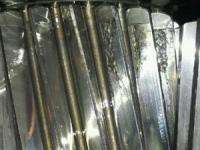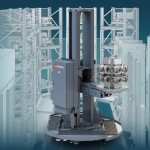Maximize Machinery Efficiency Through Gearbox Condition Monitoring
Maximize Machinery Efficiency Through Gearbox Condition Monitoring
With two in three manufacturers unware of the true cost of system downtime and mechanical failure, Gill Sensors & Controls discuss how its new condition monitoring sensors help reduce downtime, associated costs and improve reliability of large manufacturing gearboxes.

With two in three manufacturers unware of the true cost of system downtime and mechanical failure, Gill Sensors & Controls discuss how its new condition monitoring sensors help reduce downtime, associated costs and improve reliability of large manufacturing gearboxes.
The most common cause of machine failure is surface degradation, making up a significant 70 percent of failures; a large majority a direct result of mechanical wear and metallic debris build-up. Various factors trigger the build-up of metallic debris including inadequate lubrication, contamination, bearing spalling, gear polishing, pitting and overload. Each of these causes has their own attributed risk level from a small part or oil change to the urgent replacement of gears.
Vibration monitoring and laboratory analysis are some of the most common approaches to monitoring machinery condition, however these techniques have often been proven insufficient in detecting faults early enough to prevent downtime. Gill Sensors & Controls have taken the technology from their first generation Oil Debris Sensors to produce an advanced device that alerts machine operators of debris in the oil at the earliest possible stage to prevent mechanical failure and avoid thousands of pounds of costly downtime.
"The Condition Monitoring Sensor has numerous advantages over other monitoring approaches due to its continuous, real-time data" says Simon Peaty, product manager at Gill. "It will detect failure parts at a much earlier stage than vibration sensors. It also eliminates the lengthy training required to remove the natural gearbox vibration from the data captured from the vibration sensor. Furthermore, because of the continuous nature of the Condition Monitoring Sensor, data is transmitted in seconds making it much faster than laboratory analysis."
The condition sensor, which uses both induction and capacitive technology, has already been used within a large engineering manufacturers speed reducer systems to provide a real-time indication of potential maintenance issues.
The sensor works by using powerful magnets to detect metallic debris via two channels, monitoring both fine debris (wear particles from bearing and gears) and coarse debris (parts of bearing, sheared teeth and parts typically 0.5 mm² upwards). An inductive coil within the sensor probe and Gill's innovative electronic system enables the sensor to differentiate between the debris types.
Real-time analysis
Installed in the bottom of the large speed reducer sump and directly into the oil stream, the sensor collects the ferrous debris within the oil. The sensor's voltage output increases when debris is detected on the magnets, indicating an event has occurred. This was proven when regular inspection of the sensor data readings alerted the manufacturer's engineers of a large amount of ferrous particles collected on the sensor. On inspection gear flaking and cracking were found, caused by the early failure of a supporting roller bearing. As a result of the real-time detection, operators shut down the machine, during a planned maintenance period, to replace the damaged components before a catastrophic failure occurred.
"As a result of the fast detection, we were able to prevent a breakdown that otherwise would have resulted in big trouble. Installing the wear debris sensor is a good case for maintaining the speed reducer in the future" says a representative from the multinational engineering company.
It's now been made even easier to identify when particles are affecting the gearbox condition, through Gill's Industrial version Condition Monitoring Sensor, which features a local LED light indicator. The easy-to-install box provides green, amber and red indicators dependent on the severity of the debris detected on the sensor, giving operators a visual indication that maintenance actions may be required. A third channel is also available in this sensor providing the additional functions of oil temperature measurement or a change in oil dielectric, which will indicate either water contamination in the oil or loss of oil, giving operators even more insight into the health of the gearbox.
True cost of ownership
This swift indication and action taken as a result of the sensors real-time data prevented a costly mechanical breakdown of the speed reducer, which is estimated to have saved costs sufficient enough to cover the full sensor installation.
Gill's Condition Monitoring Sensors are being installed in gearboxes across a range of industries including industrial machinery, automotive, motorsport and marine gearboxes to deliver a low cost of ownership by helping to maximise equipment availability and machinery health.





